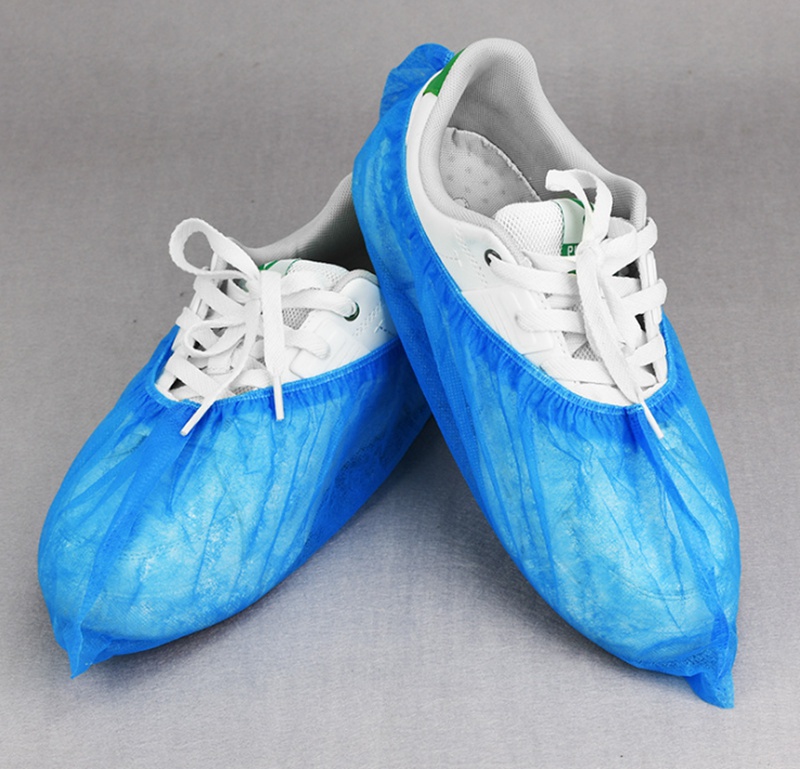Non-woven shoe covers, though often overlooked, play a critical role in maintaining hygiene and safety across a variety of industries. From healthcare settings to construction sites, these disposable coverings offer a simple yet effective solution to prevent contamination and protect both workers and environments. But what exactly makes them so essential? Let’s explore the key benefits, applications, and considerations when choosing non-woven shoe covers.

What Are Non-Woven Shoe Covers?
Non-woven shoe covers are protective covers made from synthetic materials, typically polypropylene or other non-woven fabrics. Unlike traditional woven fabrics, non-woven materials are manufactured by bonding fibers together, resulting in a durable, lightweight, and cost-effective product. These shoe covers are designed to slip over footwear, creating a barrier that prevents dirt, dust, liquids, and contaminants from spreading across clean or controlled environments.
How Do Non-Woven Shoe Covers Enhance Hygiene?
In sectors like healthcare, pharmaceuticals, and food production, hygiene is paramount. Non-woven shoe covers provide a simple yet effective way to ensure that harmful contaminants from shoes do not enter sterile areas or cleanrooms. For instance, in hospitals, preventing dirt and bacteria from shoes helps mitigate the spread of infections and maintain the integrity of medical environments. In laboratories, these shoe covers protect sensitive equipment and experiments from being contaminated by particles carried on the soles of shoes.
What Are the Key Benefits of Non-Woven Shoe Covers?
1. Cost-Effective and Disposable: Non-woven shoe covers are affordable and designed for single-use, making them a cost-efficient solution. After use, they can be disposed of easily without the need for cleaning or maintenance, ensuring that companies always have a fresh, clean pair on hand.
2. Versatility: These shoe covers are used in a variety of industries, including healthcare, food processing, manufacturing, construction, and hospitality. Their versatility makes them an indispensable tool for workplaces where cleanliness and safety are critical.
3. Durability: While non-woven materials are lightweight, they are also remarkably strong and tear-resistant. This ensures that the shoe covers stay intact throughout the duration of wear, even in environments where they may be exposed to physical wear or minor hazards.
4. Comfort and Breathability: Non-woven shoe covers are designed to be breathable, helping to prevent foot perspiration while offering comfort during extended periods of use. This is especially important for workers who need to wear protective gear for hours on end.
5. Easy to Use: Non-woven shoe covers are designed to be user-friendly, allowing workers to slip them on quickly without hassle. The elasticized edges provide a snug fit over shoes, ensuring they stay securely in place.
In Which Industries Are Non-Woven Shoe Covers Most Commonly Used?
1. Healthcare: Hospitals, clinics, and laboratories rely on non-woven shoe covers to maintain a sterile environment and prevent cross-contamination.
2. Construction: In construction and renovation sites, non-woven shoe covers are used to protect clean areas from debris and dirt that workers may carry in on their shoes.
3. Food Processing: To meet food safety standards, non-woven shoe covers are often required in food processing plants to prevent contamination from outside sources.
4. Hospitality: Hotels and event venues use non-woven shoe covers to protect floors from dirt and damage during cleaning or maintenance activities.
5. Electronics Manufacturing: In cleanrooms where electronic components are assembled, non-woven shoe covers prevent static and dust from interfering with delicate equipment.
How Do You Choose the Right Non-Woven Shoe Covers?
When selecting non-woven shoe covers for your industry or workplace, there are several factors to consider:
1. Size and Fit: Ensure the shoe covers are designed to fit a variety of shoe sizes, including larger footwear, to maximize usability.
2. Material: Check the material composition to ensure it meets your specific requirements for durability, breathability, and contamination resistance.
3. Thickness: Different thickness levels are available, and the right choice depends on the level of protection needed. Thicker covers offer better protection against liquids, while thinner options may be more comfortable for extended wear.
4. Elasticity: The elasticized edge is crucial for securing the shoe cover around the shoe without causing discomfort. Choose covers with a good elastic fit to ensure they stay in place during use.
5. Certification and Standards: In industries like healthcare and food processing, look for non-woven shoe covers that meet industry-specific safety and quality standards.
Non-woven shoe covers are an essential, cost-effective solution for maintaining cleanliness, safety, and hygiene across many industries. Whether in healthcare, food production, or construction, their ability to prevent contamination and safeguard environments makes them indispensable. By understanding their benefits and selecting the right product for your needs, you can help ensure a safer, cleaner, and more efficient workplace.
Ningbo Haishu Aite Housewares Co., Ltd. was founded in 2017, located in Haishu District, JishiGang Town, Ningbo City, China. We adhere to product serialization, product diversification, production standardization, research and development, and high efficiency for the quality of every detail. Explore our full range of products on our website at https://www.aitecleaningproducts.com/. For any inquiries, please reach out to us at sales5@nbaiyite.cn.

